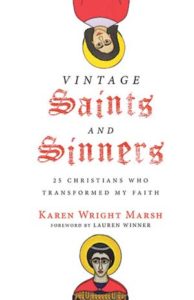Vintage Saints and Sinners: 25 Christians Who Transformed My Faith
Reviewed by Bob Dixon-Kolar
September 1, 2018
 By Karen Wright Marsh. IVP Books, 2017. 224 pages. $20/hardcover; $16/paperback; $15.99/eBook.
By Karen Wright Marsh. IVP Books, 2017. 224 pages. $20/hardcover; $16/paperback; $15.99/eBook.
Vintage Saints and Sinners: 25 Christians Who Transformed My Faith, by Karen Wright Marsh, is a gracefully written and deeply reflective set of personal essays, each focusing on the life and writings of a different “sinner-saint.” Marsh uses that hyphenated term to prompt her readers to dispel overly pious notions of who qualifies to be a saint. She posits this definition: “[A] saint is a sinner too—but is someone who, by God’s grace, goes through life in the spirit of Christ.” All of the Christians covered in her book had something of the sinner in them. In different measures and degrees, each of these 25 saintly men and women succumbed to temptations, faced existential doubts and fears, and felt alienated from God. Yet, by the grace of God, the spirit of Christ ultimately prevailed within them. As Marsh observes, “Apparently blind alleys and bypasses are part of the pilgrimage. Moments of joy and revelations of grace follow frustrated hopes and inward pains.” Marsh’s fine book shows that by having a direct encounter with these all-too-human saints—through study, prayer, and meditation—we can draw wisdom and encouragement for our own spiritual pilgrimage.
The author’s 25 transformative Christians are a diverse lot—they include philosophers (Saint Augustine, Soren Kierkegaard), founders of Christian denominations (John Wesley, Martin Luther), writers (Flannery O’Connor), monastics (Brother Lawrence, Thomas Merton, Julian of Norwich), and social justice leaders (Dorothy Day, Fannie Lou Hamer, Howard Thurman).
Marsh, whose academic training is in philosophy and linguistics, is executive director of Theological Horizons, a Christian ministry established in 1990, with a center located near the campus of the University of Virginia. The ministry came into being because she and her husband, Charles Marsh, a professor of religious studies, felt that “vibrant theological scholarship and authentic Christian community were needed inside the university.” In a podcast interview, Marsh explained that the essays comprising her book grew out of spiritual support gatherings with university students at her home. Her essays clearly show her loving commitment to these young people and her gratitude for their presence in her life. She recognizes that these students see her as mentor, teacher, and nurturer. These demanding roles—and the personal and spiritual toll that they can exact—are occasional themes of her essays.
One of Marsh’s most honest and soul-searching essays is a meditation on the private struggles of the courageous German pastor Dietrich Bonhoeffer, who was executed by the Nazis for his participation in a plot to assassinate Adolf Hitler. It deserves mention that she and Charles named their home the Bonhoeffer House for how it resembles the home that Bonhoeffer once lived in in Germany. Charles is also the author of a critically admired biography of Bonhoeffer.
Marsh provides an illuminating biographical sketch for each of the 25 Christians. She clearly demonstrates a scholar’s command of their lives and key writings. But she does not impart this learning in a “teacherly” way. Rather, she relates their life stories as compelling spiritual journeys that support her in her own spiritual journey.
After reading Marsh’s book, you may find yourself wondering: Who would be on my personal list of faith-transforming figures? In fact, you may even feel inspired (as I myself now do) to imitate Marsh’s approach: to prayerfully immerse yourself in the life and writings of one “sinner-saint,” and to reflect on what that individual’s spiritual struggles and strivings reveal about your own. I encourage Friends to read Vintage Saints and Sinners, either as an aid to solitary devotion or for use in a book discussion series for Quaker teens and adults.



Comments on Friendsjournal.org may be used in the Forum of the print magazine and may be edited for length and clarity.